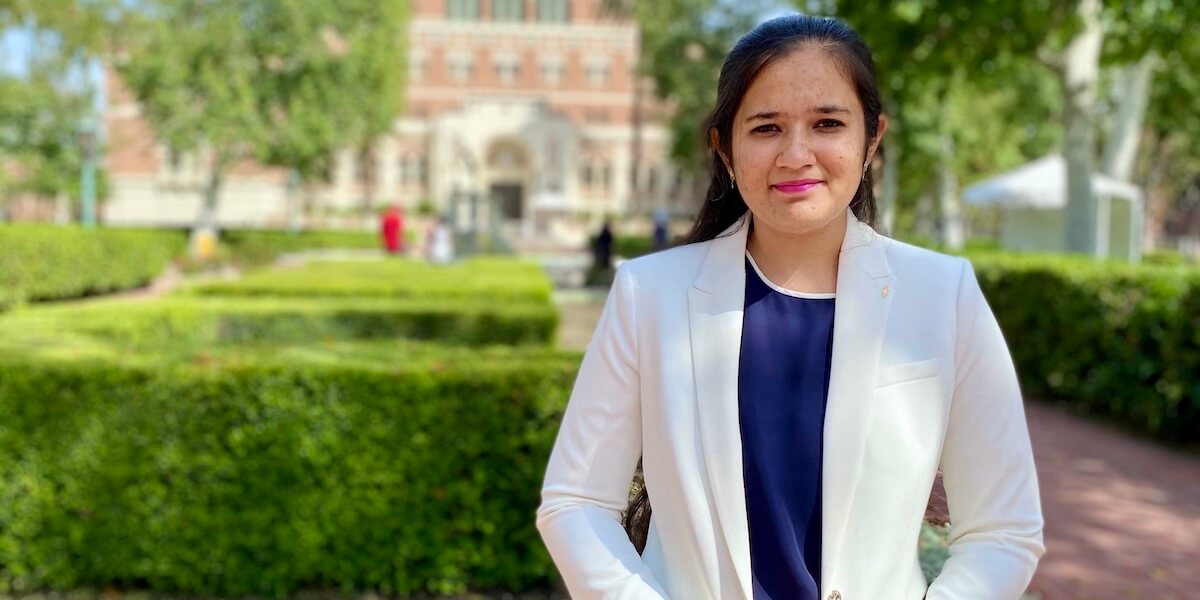
Harmita Golwala. PHOTO/HARMITA GOLWALA.
As an undergraduate in India, Harmita Golwala was naturally drawn to environmental problem solving. “I lived at a hostel and one thing I noticed is how much waste was collecting from leftover meals,” she said. “That triggered me.”
Golwala, a master’s student at USC Viterbi School of Engineering, knew they could do better. “I knew it could be decomposed, since it’s all organic matter.”
She researched existing solutions and their drawbacks. Then she created her own organic waste converter, taking all the leftover food waste and adding biomass to convert it into manure that could be used all around campus. While it was introduced at lab scale, these are the types of endeavors that continued to call to her—engineering solutions that could have a large scale and logical impact.
Golwala, who grew up in Bharuch in Gujarat, India, was always good at math and even dreamt of becoming a mathematician. But then she realized that applying her aptitude to engineering problems could have a great impact on the world. “There are so many things to innovate and actually learn, and there are always logical reasons behind that,” she said.
Surrounded by engineers—her father is a chemical engineer, and her sister is a software engineer—she found her own path. As soon as she realized her passion for environmental engineering, she knew she wanted to study at a university closer aligned with her interests. “I felt like in India, it is still developing, so there is not yet much focus on environmental research. From the beginning, I wanted to pursue research work and USC Viterbi was perfect from that perspective,” she said.
Golwala and her sister had been separated for over a decade, but when she started at USC, she went to live with her sister, who works with Comcast, in Irvine. There her passion for the environment grew through her appreciation of her beautiful natural surroundings: amazing beach sunsets and walks along her favorite beach in Southern California—Laguna.
Meanwhile, studying at the Sonny Astani Department of Civil and Environmental Engineering, Golwala knew she wanted to find a research opportunity that could elevate her connection to environmental progress. As a member of Adam Smith’s research group, she worked on micro-plastics, which come from larger plastic and degrade into smaller and smaller pieces and contaminate the environment, including water sources.
“Most studies had focused on microplastics in marine systems, but our study looked at other major sources that contributed to water contamination. We investigated land-based sources like solid waste,” Golwala said. Like during her college days in India, Golwala focused on food waste, in particular.
When research was shut down due to the global pandemic, Golwala focused her efforts on writing up and sharing the results of this work. It was Golwala’s first peer-reviewed, published research paper that she also helped author, with the guidance of Smith and CEE post-doctoral scholar Syeed Md Iskander. Recently, she was awarded the USC Viterbi Master’s Student Research Award. “It was one of the most memorable moments I enjoyed at USC and one of the happiest,” Golwala said.
For Golwala, micropollutants like microplastic are of significant, long-term interest. “The treatment of wastewater is becoming more and more challenging,” she said. Membranes and other technologies are areas she hopes to continue to explore to help alleviate issues related to water scarcity and emerging contaminants. At the same time, she said that there needs to be more partnership between academia and industry.
“More research needs to be applied at the industrial scale, expanding past academia,” she said. “The transition from lab scale is still lacking—and we could be using these innovations to solve global problems,” she said.
Though India was lagging with environmental research, Golwala hopes that ultimately, she can bring back lessons learned from her work in the U.S. and apply it there. “I hope I can learn many things from here and contribute to India in the future, to provide impact for my home and its people,” she said.
Published on May 18th, 2021
Last updated on May 18th, 2021













